[This story could be treated as an addendum to the main post – The Early Buddhist Women- stories]
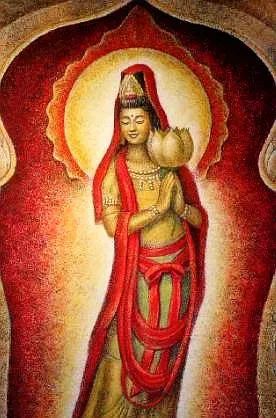
Besides those who embraced homelessness and became Bhikkhunis, there were large numbers of women who took to Buddha Dhamma in their lay-life. Perhaps because the women were allowed to support and participate actively in the secular and spiritual matters, the early Buddhism gained immense appeal; and spread fast and wide.
Those women supported the Sangha in various ways; and more importantly, they tried putting into practice the teachings of the Buddha in their day-to-day lives. In a manner of speaking, their contribution to Dhamma was more significant. Because, even while the Buddhist monasteries virtually disappeared from India, the teachings of the Buddha and his values of peace, non-violence and amity melted down into the Indian society exerting a long-lasting influence, thanks mainly to his lay-female disciples.
The extraordinary story of Mallika rising from the daughter of a gardener to become the principal queen of the kingdoms of Kasi and Kosala is truly fascinating. She held a position of honor and authority; and she was well respected. But more significant was her sound common sense, the generosity of her heart and the genuine desire to help the poor and the weak; and to bring into practice the teachings of her Master, the Buddha in whom she had enormous faith and reverence. She tried to bring love, understanding, kindness and amity into her domestic as well as public life. She exerted considerable influence in moulding the king’s attitude and his policies. And, she was fairly successful in bringing about some sensible changes.

1. The Marriage
1.1. The chief garland-maker to the king of Kosala, living in the capital city Savatthi (Snkt.Sravasthi) had a beautiful daughter. The garland maker named his fair, slender and lovely daughter as Mallika, the Jasmine. The little girl was clever, well behaved and graceful.
1.2. When she was about sixteen, on a beautiful clear day, Mallika was enjoying a playful time with her friends at the public flower garden. As she was chirpily running in and out of the garden, she noticed a group of monks pass by the garden gate. She was attracted by the regal gait and the dignity of carriage of one of the monks; and was transfixed by the beatific smile on his serene face. She walked up to him, impulsively poured three portions of the puffed rice she carried in her basket as her lunch, into the alms bowl of that monk.
She was at once filled with a deep sense of fulfillment and joy. Suffused with happiness she bent and touched the feet of the monk in reverence.
As if infected by her joy, the monk too smiled gently in benediction. Little did she know that the monk radiating sublime peace and joy was none other than Bhagava the enlightened one, the Buddha.
1.3. That afternoon a sense of happiness and of dancing on a cloud of joy filled the little girl’s heart. She sang and danced with great delight round and round the garden. By then, a tired warrior just beaten in a battle, riding back his home pensive and rather dejected was passing by the garden. He was drawn, as if by magic, to the melody and the infectious joy of the girl’s song. A balm like cool peace descended on his aching heart. He involuntarily rode up to the girl singing and dancing delightfully unmindful of the world around her. He was at once struck by the innocent countenance of the cheerful bright girl; and by the joy she radiated.
1.4. As the tired looking stranger approached her, Mallika was not scared; instead, she took the reins of the horse and looked straight into his eyes. She noticed the weariness in his eyes and helped the horseman dismount and lie down near a bower. Mallika rubbed his feet with a piece of wet cloth and gently fanned him. As she did so, the youth fell asleep. When he woke up after a while, he looked deep into her face and enquired who she was, and whether she was already married. Mallika coyly replied, no she was not. Thereafter, he thanked her; and let her mount his horse behind him and rode to her house.
1.5. The young horseman was Pasenadi (Snkt. Prasenajit) the king of Kosala. He had just lost a battle with his neighbor Ajatasattu the mighty king of Magadha. Defeated in the battle and forced to retreat, Pasenadi was riding back to his palace in Savatthi, distressed and downcast. It was then that Pasenadi chanced upon Mallika and her enchanting melody; and was captivated by her innocent and cheerful demeanor.
1.6. In the evening, king Pasenadi sent an entourage with much pomp to fetch Mallika; and he made her his wife and principal Queen. It is said; Mallika was the beloved of the king who came to appreciate her wisdom and her approach to life and its problems. He consulted and accepted her advice on important matters.
Her subjects too loved their beautiful queen. Wherever she was seen in public, people would joyously tell each other: “That is Queen Mallika, who gave alms to the Buddha.”(J 415E)
2….And After
2.1. The Canon contains a number of discourses addressed to Mallika as also to Pasenadi by the Master. These are included in Samyukta Nikaya and collated under Kosala Samyutta. The discourses delivered to Mallika and Pasenadi cover wide range of subjects such as the position of girl-child and women; the right ways of conduct; loss of dear ones; the futility of wars; treatment of vanquished enemies; and their subjects etc. These discourses are of much interest as they shed light on the early Buddhist position on a number of issues.
2.2. Soon after she became the Queen, Mallika called upon the Master to pay her respects. During the course of the conversation she hesitantly asked the Master, why is it that one woman could be beautiful, wealthy and of great ability; another be beautiful but poor and not very able; yet another although ugly, be rich and very able; and finally another be ugly, poor and possess no skills at all. Why do such differences occur? Is there a rationale in this world?
“Why is it that some women are beautiful, wealthy and powerful,
While some are beautiful but without wealth and power,
And yet others ugly but wealthy and powerful,
And some ugly, poor and without power?
The Buddha explained to her that all attributes and living conditions of people everywhere are dependent on their moral purity (shila). The beauty comes forth from the gentle and forgiving nature of a person; the prosperity arises due to the generosity of the heart; and, the skill and power have their roots in never envying others but rejoicing in others’ success and always lending support to their virtues.
Very rarely do the entire three virtues manifest in a person; and when it does, that person would be beautiful, wealthy and powerful. Otherwise, whichever of these three virtues a person had cultivated would manifest, usually in varying degrees of combination with other virtues.
“The uprising of a being is from what has come to be; by what he has done, by that he upraises” (M i 390; MN 57).
2.3. On listening to this discourse of the Buddha, Mallika resolved that she would henceforth practice generosity, compassion and patience, and be happy at the success of others. She promised herself, in her heart, to be always gentle towards her subjects; to give alms to all monks, Brahmans and the poor; and never to envy anyone’s happiness. She then took refuge in the Buddha, Dharma and Sangha and remained a faithful disciple for the rest of her life.(A IV, 197)
2.4. Queen Mallika practiced generosity by helping the poor, by offering alms and by building a large ebony-lined hall in her private garden Mallikaarama among the tinduka (diospyros) evergreen trees, for conducting Dhamma discussions. She practiced gentleness in her management of the royal household, in serving her husband; and in caring for the retinue of her staff and her subjects. And when her husband Pasenadi took Vasabha Khattiya (a cousin of the Buddha) as his second wife, Mallika welcomed her and treated her as a younger sister, without envy or jealousy. It is said; both women lived in peace and harmony at the court.(M 78, D 9)(A VI, 52)
2.5. In due course, Vasabha Khattiya, her co-wife, gave birth to a son, the crown prince- to- be; and Mallika delivered to a daughter. Yet Mallika was not envious of Vasabha but rejoiced in Vasabha’s good fortune. Pasenadi was, however, disappointed that her principal queen did not present him with a son.
When Pasenadi confided in the Buddha his disappointment, the Teacher counseled him saying: a well brought-up girl was superior to a man if she was clever, virtuous, well-behaved and faithful. Then she could uplift the family and train her children and the generations to follow, to be virtuous persons. She could even become the wife of a great King or give birth to a mighty Ruler. A Mother’s contribution in bringing up and molding the character of the succeeding the generations is, indeed, immense. The Master advised Pasenadi to bring up his daughter with love and devotion, without undue attachment or prejudice.
A girl-child, O Lord of men, may prove
2.6. The King Pasenadi once asked a wise and well-learned layman whether he could give Dhamma lessons to his two Queens. The lay- scholar replied that the teaching originated from the Enlightened One and only an immediate disciple of his could pass it on to others. The Buddha, at the request of the king, appointed his close disciple and cousin Ananda to impart teachings to the two queens. It is said; Queen Mallika understood and learnt easily, while Queen Vasabha Khattiya, cousin of the Buddha and mother of the crown-prince could not concentrate and learned with difficulty.(DhA.i.382f)

3. Married Life
3.1. It was not milk and honey all the while. There were occasional little quarrels and misunderstandings, just as in any marriage. Pasenadi would often complain that Mallika didn’t love him enough. He would scowl “becoming a queen had gone into her head. What does she think of her? She has gone mad because of her fame and fortune “. Pasenadi, as if in retaliation, would take no notice of Mallika and pretend “as if she had vanished into thin air”. When the matter came up to the Buddha, he counseled both to put away their little differences and live in love and understanding. He also narrated the events and their love in their past lives; and how they suffered after being separated. The Buddha praised the blessing of friendship and harmony in marriage. (J 519)
The little differences were then sunk and forgotten, as if they never happened. Mallika in grateful joy thanked the Buddha:
With joy I heard your varied words,
Which spoken were for our well-being;
With your words you dispelled my sorrow.
Verily, you are the joy-bringer amongst the ascetics
May you live long, my Ascetic Bringer of Joy..!
3.2. Yet, for some reason, Pasenadi was not fully convinced that Mallika loved him entirely. One evening while Mallika was in the palace balcony looking across the river, Pasenadi asked her quietly whether there was anyone in the whole world she loved more than herself. Pasenadi fondly hoped to get the response that he loved to hear – that Mallika would say she loved him more than her very life.(S.i.75; Ud.v.1).
Mallika pondered over the question for a short while; and then spoke calmly, in an even tone. She said that she knew of no one dearer to herself than herself. Pasenadi felt slightly let down. Then Mallika questioned Pasenadi whether he loved anyone more than himself. Pasenadi haltingly conceded that self-love was upper-most in every creature.
Pasenadi still had some doubts about the correctness of Mallika’s reply. He hoped that the Buddha would differ from Mallika and say something that would make him happy. He then recounted to the Buddha the conversation he had with Mallika and sought the Master’s opinion. The Buddha then confirmed his and Mallika’s statements.
I visited all quarters with my mind
Nor found I any dearer than myself;
Self is likewise to every other dear;
Who loves himself may never harm another.
3.3. One day, Pasenadi learnt that the Buddha counseled a person who just had lost a child “Those who are dear bring sorrow, lamentation, pain, grief and despair”. Pasenadi thought that the Buddha’s words were rather inappropriate. He expressed his unhappiness to Mallika who then calmly replied “if the Master has said so, O king then it surely must be so”. That irritated Pasenadi; and he growled that she does not exercise her mind but just hangs on the words of her teacher. ( Piyajātika Sutta M.ii.106ff )
Mallika, to be on the safer side, then sent her messenger Nalijangha to the Buddha to ascertain the exact position. After obtaining the details, Mallika questioned Pasenadi whether he loved his daughterPrincess Vajiri, his second wife Queen Vasabha, the crown-prince Vidudabha, herself and his kingdoms of kasi and Kosala. He promptly replied, yes I do love all the five you mentioned. Mallika then continued, whether he would not feel sorrow, lamentation, pain, grief and despair if something untoward happened to all or any of the five he loved dearly.
Pasenadi understood the purport of the Buddha’s counsel and why Mallika revered him. (Piyajatika Sutta – A. 49)

4. Discourses addressed to Pasenadi
4.1. On one occasion while counseling on the right conduct of a king, the Buddha said to Pasenadi that a king should not disregard or overlook four elements: a warrior prince, a snake, a spark of fire and a Bhikkhu. The Buddha explained that a warrior prince though young if not properly handled could ruthlessly cause harm to others, just as a small poisonous snake would. A spark of fire if enraged could rapidly grow into a ball of blaze engulfing everything around it and burning it down into ashes. A young and a diligent monk is a potential Arhant and therefore should be treated with respect. The alms to monks should be offered with devotion and fervor; that would bring happiness to the giver and the receiver.
A dish may be insipid or savory,
The food may be meager or abundant,
Yet if it is given by a friendly hand,
Then it becomes a delicious meal.”
4.2. Once Pasenadi enquired how one could ascertain whether or not a person looking like an ascetic was an Arhant, the one who has realized the goal of nirvana. The Buddha explained that it was difficult for an ordinary person to reach a correct conclusion in that regard. He said, it was only by close association and that too after a long period of association, one could know a person’s conduct. Only an attentive and intelligent person of discretion (viveka) can fairly and dispassionately judge another:
Not by his outward guise is man well-known,
In fleeting glance let none place confidence.
The unrestrained live in the world at large.
Or a bronze coin coated with gold,
Some fare at large, hidden beneath disguise,
On the surface comely and fair; within impure.”
4.3. On another occasion, Pasenadi overpowered and defeated his nephew and foe of many years, Ajatasattu the king of Magadha. And, Pasenadi confiscated the vanquished king’s wealth, horses, chariots, elephants and his soldiers. He also held Ajatasattu captive, as a prized trophy of his victory. When the Buddha heard of the running feud and the hatred between the two, he remarked that neither the victor not the vanquished would be at peace:
“Victory breeds hatred.
The defeated live in pain.
Happily the peaceful live,
Giving up victory and defeat.”
4.4. The Buddha did not particularly like the plunder and the arresting of Ajatasattu. He remarked that it would have been wiser for Pasenadi not to have retained anything for himself as spoils of victory.”A man may plunder, as he will. When others plunder in return, he who is plundered will plunder in return. The Wheel of Deeds turns round and makes the ones who are plundered plunderers.”
“A man may spoil another,
Just so far as it may serve his ends,
But when he’s spoiled by others,
He, despoiled, spoils yet again.
*
The fool does fancy, now’s the hour, the chance!
But when the deed eventually bears fruit,
He fares ill.
The conquered gets one who conquers him.
The abuser wins abuse,
The annoyer frets.
A man who spoils is spoiled again.”

4.5. One night, the King had a succession of sixteen perturbing dreams. When the King woke up from these nightmares, great fear seized him; and sitting upright and trembling, he awaited the sunrise. When his Brahman priests asked him whether he had slept well, he related the terror of the night and sought their advice on what one could do to counteract such a menace. The priests promptly declared that one would have to offer great sacrifices in order to pacify the evil spirits. In his mortal fear the King agreed to that.
When Queen Mallika came to know of the bad dreams and the suggested remedy, she was deeply perturbed; and decided to dissuade her husband, King Pasenadi, from holding a great animal sacrifice. She was horrified, and exclaimed: “Where did you ever hear of saving the life of one by the death of another? Just because a stupid Brahman told you so, why must you plunge the whole populace into suffering?” (Dh A ii 8; cf. Ja I 335). Slaying animals for a whim is against Dhamma and Shila (moral injunction). It also badly affects common folks who depend on those animals for earning a livelihood. Such grievous sin would prolong the sacrificer’s bondage to the wheel of Samsara.”Long is the Samsara for fools who do not know true Dhamma” (Dh 60).
At the instance of Mallika, Pasenadi related his bad-dreams to the Buddha; and apprehensively asked what would happen to him. “Nothing” replied the Master who then explained the significance of those bad dreams. The sixteen dreams, he said, were prophesies, warning the king that the living conditions on earth would deteriorate rapidly due to the moral misconduct of the kings. Pasenadi had somehow just caught a glimpse of the coming events.
The Master advised the king to be kind and moral too; and to do good deeds abundantly for the well-being of his subjects. That alone, he said, was the proper remedy and not needless killing of animals in large numbers.
Pasenadi discarded all plans for the sacrifice; and, it is said, became a devoted lay disciple of the Buddha. (J 77 & 314)

5. Death of Queen Mallika
5.1. It appears Mallika died rather suddenly. The news of her death reached Pasenadi when he was listening to a discourse by the Buddha. He was deeply shaken and inconsolable in grief. The Buddha tried consoling him, saying:
***
They have death in prospect.
All vessels wrought by the potter,
Whether they are baked or unbaked,
Are breakable – they end broken;
They have breakage in prospect.”
that one who knows well how to seek the good.
Here, what good is gained? — None at all indeed,
5.2. Nothing that the Buddha said to him about the inevitability of old age and death; and the impermanence of all that comes into existence could assuage his grief. (A V, 49)
Pasenadi’s attachment to Mallika was so strong that he pestered the Buddha to ascertain the happiness and well-being of his departed beloved in her next state of existence. He went to the Buddha day after day for seven days; at the end of which the Master consoled him saying that Mallika was happily reborn in the haven of the blissful devas.
Pasenadi the king of Kosala thus consoled and strengthened in mind left in peace.

The Issues:
The story of Queen Mallika throws up a number of interesting issues.
1. It appears that even during the Buddha’s time the male progeny was preferred and valued, though there had been no consistent ill-treatment of little girls or injustice shown to them for the very reason that they were not boys.
King Pasenadi did not conceal his disappointment that his principal queen did not present him with a male heir to the throne. The counseling offered by the Buddha sounds like a diplomatic response in order to allay the king’s disappointment; and to forestall the possibility of his neglecting Mallika and her daughter. The Buddha’s treatment of women was equitable. His words to Pasenadi have to be placed in the context of his times and the rest of his teachings.
2 . In the early Buddhism, the attitude towards a woman was not ideal, as it is commonly made out. But it did provide the woman more opportunities for her growth, spiritual or otherwise. It is perhaps because the woman was allowed to participate and to support the Sangha, the Buddhism in its early stages, could spread fast and wide.
3. You find the Buddha offering his counsel and guidance on matters relating to married life and its problems. The Buddha, often, supported the woman, reconciled the differences and preached about the virtues of amity and harmony in a marriage.
4. The Buddha’s views on occupation and confiscation of enemy property are truly an enlightened one. The history and even the terrifying events in the present day world haveproved validity of the Master’s wisdom.
Just so far as it may serve his ends,
But when he’s spoiled by others,
He, despoiled, spoils yet again.
The conquered gets one who conquers him.
The abuser wins abuse,
The annoyer frets.
A man who spoils is spoiled again.
5. Similarly, his guidance on handling one’s grief is also very sound.
Here, what good is gained? — None at all indeed,
![AshtavakraGeetaQuotes5[1]](https://sreenivasaraos.com/wp-content/uploads/2012/09/ashtavakrageetaquotes51.jpg?w=168&h=225)

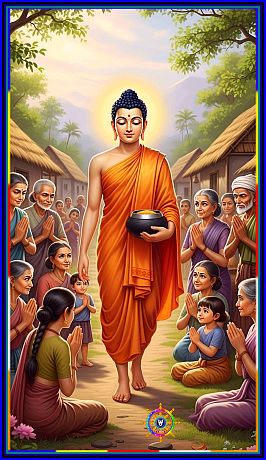
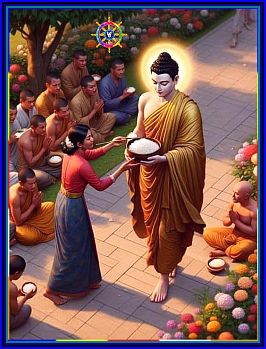
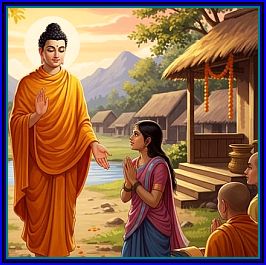
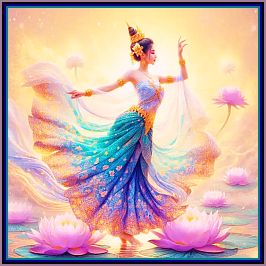
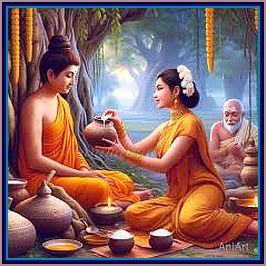
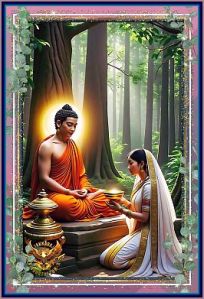
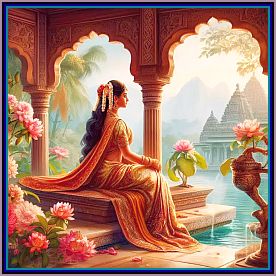
sreenivasaraos
March 19, 2015 at 5:22 pm
mallika’s story
the respect she gained form pasedi’
and her enlightenment
truly a role model for evolved women…
tahnks sreenivasarao garu…
DSampath
sreenivasaraos
March 19, 2015 at 5:25 pm
Dear Shri Sampath, Thank you .Please also read the Introduction to this series; and the rest of the posts. Regards
sreenivasaraos
March 19, 2015 at 5:24 pm
This is a gem of article
Thanks for writing this.
Bijaya Ghosh
sreenivasaraos
March 19, 2015 at 5:24 pm
Dear Bijaya Ghosh, Thank you. I am glad you read; and, delighted you liked the story. Please read next the story of Visakha, perhaps the most delightful of all the stories of the early Buddhist women. Regards
lotuskorea
March 1, 2021 at 4:08 am
Dear sreenivasaraos,
Thank you for your wonderful article! It’s so helpful. I am Minhee Kim a Korean lay Buddhist who are right now making youtube regarding Buddhism to help Koreans learn about Buddhism and English at the same time.
These days, I am working on Mallka’s story for Korean readers and having hard time getting good related images. While searching for images, I got to meet this article of yours. I am so delighted to see this great and beautiful image of Mallika!
May I ask you to provide me with the image -Mallika, standing and holing the lotus (the first image of this article) and allow me to use the image for my youtube?
My youtube is
I have been releasing about 15 episodes and next one is Mallika.
I’d be very grateful if you could kindly help me with the image.
My email address is minnie3@empas.com. You can either reply me here or reach me via email.
Many thanks and look forward to hearing back from you!
Best regards,
Minhee
sreenivasaraos
March 1, 2021 at 4:15 am
Dear Lotus Korea
Thank you for the visit ; and, for the appreciation
Yes .You may please use the image of Queen Mallika
Please also see the the stories of the other Buddhist women , in the series
But, reading the Part One is essential; as, it provides the general background
And, the stories are mere elaborations of the principles therein
Wish you success in all your endowers
Please take care
Stay safe, healthy and happy
keep in touch
Cheers and Regards
lotuskorea
March 1, 2021 at 4:20 am
Dear sreenivasaraos,
Thank you soooo much for your generous permission and quickest reply. I am very grateful.
May I ask you to provide me the original file of the image?
It’s because I am not unable to use the file for the youtube.
When I downloaded it from the blog, it’s only 26kb unfortunately.
I sincerely hope you can send me the file via my email.
Many thanks~^^
Best regards,
Minhee
sreenivasaraos
March 1, 2021 at 8:35 am
Ok
See , if this suits you
The image , however, is not sharp
https://monchay.com/tag/nu-phat/
Let me know
if it is ok
Or will try something else
Cheers
lotuskorea
March 2, 2021 at 1:36 am
Hi Sreenivasaraos~~
Thank you for your kind and sincere efforts to help me with this.
However, unfortunately, the image you provided is too small to use… still 24kb something…
Would there be other way to get the original image file? at least bigger than 2mb…
How should i indicate the copyright to the image when I use it?
Would this “Image of Mallika (c)sreenivasaraos” be good?
Many thanks in advance! ^^
Best regards,
Minhee
sreenivasaraos
March 2, 2021 at 3:03 am
Dear Minhee
I have just sent you a picture of Queen Mallika, which is about 3685 Kbs in size
It is on internet; and is in public domain
I trust the picture opens
Please let me know
Please keep talking
and let me know if I can be of any assistance
Regards
lotuskorea
March 2, 2021 at 1:50 pm
Dear sreenivasaraos,
Thank you so much for your sincere efforts to find the original file for me.
I did not know that it was something available in the public domain.
You must have worked so hard to find it! How grateful.
I will make good use of it and keep talking with you.
Many many thanks and wish you all the best luck in your life!
Best regards,
Minhee
sreenivasaraos
March 2, 2021 at 2:05 pm
Dear Minhee
I am glad that I was of some assistance to you
Please check the Categories column on this page , on your right hand side
I have posted may articles concerning the Buddha, the Buddhism , the Buddhist women and Bodhidharma
See if these would be any use to your project
God Bless you Maa
Be happy forever
Please keep talking
Cheers and Regards
lotuskorea
March 15, 2021 at 6:24 am
Dear sreenivasaraos,
I am very pleased to give you the youtube link about Queen Malica. My editor team says that even the file was big enough, the image wasn’t still clear enough, so could not use it much. I am very sorry. But the image was very essential for this episode. Thank you so much for your kind and heartful efforts.
May the Buddha’s blessings be with you.
Best regards,
Minhee
sreenivasaraos
March 15, 2021 at 9:35 am
Dear Minhee
A beautiful and lucid presentation
Congrats
Thanks for sharing
May the Buddha bless us all
Regards